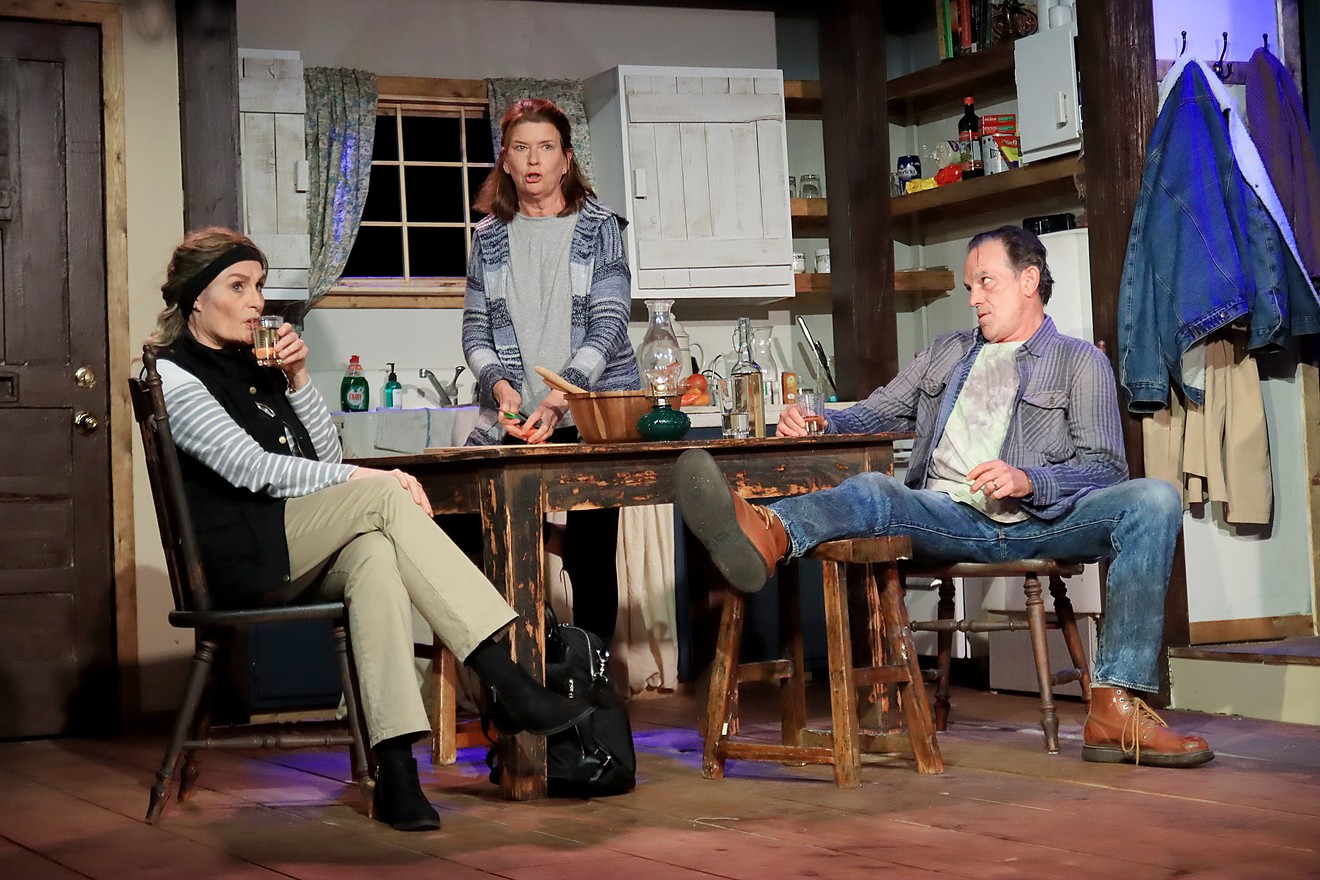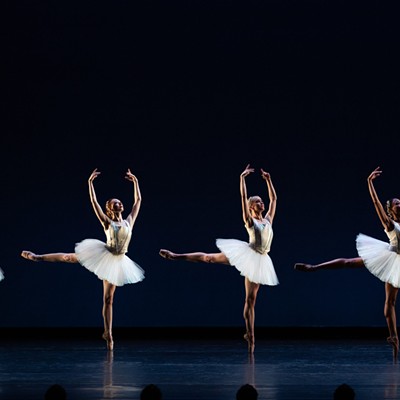Responsibility and impact. These are the themes at the center of many of Lucy Kirkwood’s award-winning and celebrated plays. Houston audiences got a taste of this last February when Stages Repertory Theatre produced Kirkwood’s, NSFW, a play examining the consequences of female sexual objectification for commercial gain.
Now, with Kirkwood’s The Children, getting a handsome production at Rec Room Arts, we’re once again introduced to characters colliding with notions of obligation and accountability, only this time, it’s not the naked body we’re concerned with. It’s the land that our bodies live on and what it could do to us if we don’t tend to it carefully.
Retired nuclear scientists Hazel (Sally Burtenshaw) and Robin (John Feltch) live in an isolated cottage on the coast of England. It’s not their home, mind you. They moved there after a tsunami caused a melt-down disaster at the local power station where they used to work. Their old home and farm, now in the exclusion zone of irradiated land, is unlivable. Electricity is rationed. Meals consist of lettuce, some vegetables (grown by a neighbor) and bread. A wind-up radio must be prepped in order to tune into the BBC. A Geiger counter is kept on hand to test for radiation.
And yet they stay. They could move away. Their cottage isn’t that far really from the disaster. But Hazel feels a tie to the land, an obligation if you will. She does yoga to stay healthy and stays in close touch with her eldest daughter. Robin makes wine out of elderberries and parsnips and still goes back to feed the cows he’s left behind that miraculously survived despite being inside the danger zone. They have a decent enough existence, even with the compromises.
But then in walks Rose (Susan Koozin), a fellow nuclear physicist and colleague who they haven’t seen in 38 years, disrupting their calm lives and clear consciences. Is she there to rekindle her on again off again love affair with Robin or does she have a bigger, more consequential purpose?
For a one-act play clocking in at just under 2 hours, Kirkwood makes us wait an extraordinarily long time for answers. Which would be far more satisfying if the action before the action had some momentum or pay off. Instead, we get old colleagues catching up, flirting, fighting, reminiscing, talking about nothing in particular and round and round she goes in an overly talky, often humorous fashion.
Lucky for us, we have director Brandon Weinbrenner at the wheel and an expert cast to keep us entertained during Kirkwood’s lengthy buildup.
Navigating his actors around Stefän Azizi's small but gorgeously detailed interior cottage set design, Weinbrenner smartly employs subtle gestures to lend visual interest to what is essentially three people talking for almost two hours. I lost count of how many times footstools or benches or even a tricycle at one point were used to prop feet up, but each time, and in many other instances, Weinbrenner’s direction has the lovely whiff of confined space ballet.
For their part, Koozin, Burtenshaw and Feltch, all performing at the top of their game, leaned into the close quarters, and into each other with great panache. If we’re going to be made to wait for the meat of this show, there’s no better cast to spend time with. Whether it’s Koozin and Burtenshaw playing frenemies, Feltch and Burtenshaw doing that thing where old married couples insult each other but do so with a wink of great love, or Feltch and Koozin fanning the embers of their previous dalliance, we’re all in for the ride.
When the revelations finally come late in the play, they come fast and furious. And it’s here that Kirkwood finally unleashes the structurally serious question of responsibility for each of her characters. Without giving anything away, there’s a reason the play is called The Children. After all, who do we feel the most responsibility for in life, but our children?
However, while Kirkwood addresses the family dynamic in her play, she’s ultimately interested in a larger swath. For her, children mean more than your kin. They mean those generations affected by your actions, intentional or not. For nuclear scientists who once worked at a now toxic power station, those actions and responsibilities run deep. And the ultimate pay off of the play is watching how each character, legally obligated to do nothing, decides to act.
The Children continues through December 7 at Rec Room Arts, 100 Jackson. For information, visit recroomarts.org. $15-40.
Support Us
Houston's independent source of
local news and culture
account
- Welcome,
Insider - Login
- My Account
- My Newsletters
- Contribute
- Contact Us
- Sign out

Susan Koozin, Sally Burtenshaw and John Feltch in Rec Room Art's production of The Children
Photo by Pin Lim
[
{
"name": "Related Stories / Support Us Combo",
"component": "11591218",
"insertPoint": "4",
"requiredCountToDisplay": "4"
},{
"name": "Air - Billboard - Inline Content",
"component": "11591214",
"insertPoint": "2/3",
"requiredCountToDisplay": "7"
},{
"name": "R1 - Beta - Mobile Only",
"component": "12287027",
"insertPoint": "8",
"requiredCountToDisplay": "8"
},{
"name": "Air - MediumRectangle - Inline Content - Mobile Display Size 2",
"component": "11591215",
"insertPoint": "12",
"requiredCountToDisplay": "12"
},{
"name": "Air - MediumRectangle - Inline Content - Mobile Display Size 2",
"component": "11591215",
"insertPoint": "4th",
"startingPoint": "16",
"requiredCountToDisplay": "12"
}
,{
"name": "RevContent - In Article",
"component": "12527128",
"insertPoint": "3/5",
"requiredCountToDisplay": "5"
}
]
KEEP THE HOUSTON PRESS FREE...
Since we started the Houston Press, it has been defined as the free, independent voice of Houston, and we'd like to keep it that way. With local media under siege, it's more important than ever for us to rally support behind funding our local journalism. You can help by participating in our "I Support" program, allowing us to keep offering readers access to our incisive coverage of local news, food and culture with no paywalls.
Jessica Goldman was the theater critic for CBC Radio in Calgary prior to joining the Houston Press team. Her work has also appeared in American Theatre Magazine, Globe and Mail and Alberta Views. Jessica is a member of the American Theatre Critics Association.
Contact:
Jessica Goldman
Trending Arts & Culture
- Kinetic Ensemble's Finale Blends Music, Dance
- Top 5 Sickest Stephen King Sex Scenes (NSFW)
- The 10 Best And Most Controversial Hustler Magazine Covers Ever (NSFW)
-
Sponsored Content From: [%sponsoredBy%]
[%title%]

Don't Miss Out
SIGN UP for the latest
arts & culture
news, free stuff and more!
Become a member to support the independent voice of Houston
and help keep the future of the Houston Press FREE
Use of this website constitutes acceptance of our
terms of use,
our cookies policy, and our
privacy policy
The Houston Press may earn a portion of sales from products & services purchased through links on our site from our
affiliate partners.
©2024
Houston Press, LP. All rights reserved.





